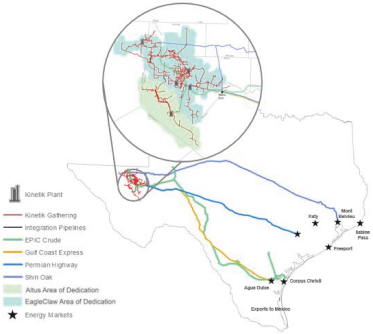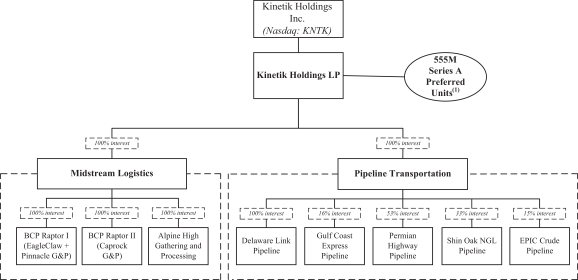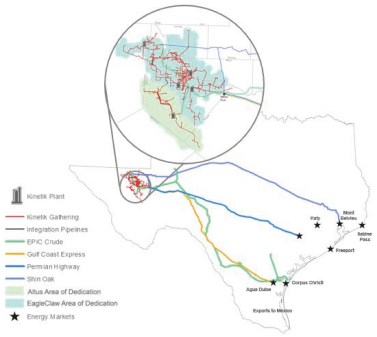Risks Related to Ownership of Our Common Stock
Entities controlled by Blackstone and I Squared Capital, and Apache Midstream own a majority of the Company’s outstanding voting shares and thus strongly influence all of the Company’s corporate actions.
As long as Blackstone, I Squared, Apache Midstream and their respective affiliates own or control a significant percentage of the Company’s outstanding voting power, they will have the ability to strongly influence all corporate actions, including those requiring stockholder approval, the election and removal of directors. The interests of Blackstone, I Squared Capital or Apache Midstream may not align with the interests of the Company’s other stockholders.
The Company’s ability to pay dividends depends on its ability to generate sufficient cash flow, which it may not be able to accomplish.
The Company’s ability to pay dividends principally depends upon the amount of cash it generates from its operations, which will fluctuate from quarter to quarter based on, among other things, income from the Pipeline Transportation JVs, the volumes of natural gas and NGLs it gathers and processes, commodity prices, and other factors impacting the Company’s financial condition, some of which are beyond its control. In addition, under Delaware law, dividends on the Company’s capital stock may only be paid from “surplus,” which is the amount by which the fair value of the Company’s total assets exceeds the sum of its total liabilities, including contingent liabilities, and the amount of its capital; if there is no surplus, cash dividends on capital stock may only be paid from the Company’s net profits for the then-current and/or the preceding fiscal year.
Holders of the Partnership’s Preferred Units have rights, preferences, and privileges that are not held by, and are preferential to the rights of, holders of Common Units, and could dilute or otherwise adversely affect the holders of Common Units.
The Partnership’s Preferred Units rank senior to the Common Units in distribution and liquidation rights, and holders of Preferred Units will be entitled to receive a liquidation preference that incorporates an agreed return on the holders’ investment.
The Company depends on the Partnership for distributions, loans, and other payments to generate the funds necessary to meet the Company’s financial obligations or to pay any dividends with respect to its Class A common stock. Obligations of the Partnership in respect of the Preferred Units may restrict, reduce, or render unavailable funds that otherwise may be available to be distributed, loaned, or paid to the Company by the Partnership or loaned to, or invested in, the Partnership by third parties.
The Company’s charter designates the Court of Chancery of the State of Delaware as the sole and exclusive forum for certain types of actions and proceedings that may be initiated by its stockholders, which could limit its stockholders’ ability to obtain a favorable judicial forum for disputes with the Company or its directors, officers, employees, or agents.
The charter provides that, unless the Company consents in writing to the selection of an alternative forum, the Court of Chancery of the State of Delaware (Court of Chancery) will, to the fullest extent permitted by applicable law, be the sole and exclusive forum for any derivative action or proceeding brought on the Company’s behalf; any action asserting a claim of breach of a fiduciary duty owed by any of the Company’s directors, officers, or other employees to it or its stockholders; any action asserting a claim against the Company or any of its directors, officers, or employees arising pursuant to any provision of the DGCL, the charter, or the Company’s bylaws; or any action asserting a claim against the Company or any of its directors, officers, or other employees that is governed by the internal affairs doctrine.
The above does not apply for such claims as to which the Court of Chancery determines that it does not have personal jurisdiction over an indispensable party, exclusive jurisdiction is vested in a court or forum other than the Court of Chancery, or the Court of Chancery does not have subject matter jurisdiction.
S-25



